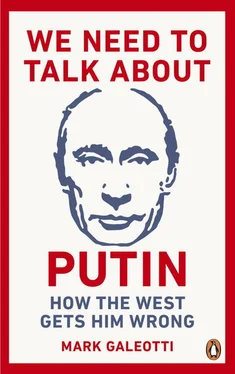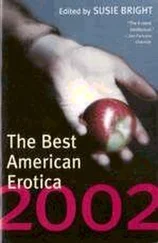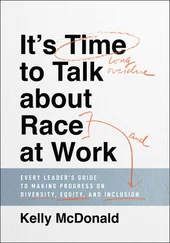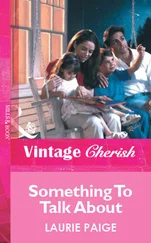To be sure, Putin is Homo Sovieticus , a product of Soviet times. He played in a Leningrad scarred by its ferocious defence against the Nazi invaders in a war appropriated by the Party as part of its legitimating mythology. As a schoolboy he studied the heavily politicised versions of history prescribed by the government, in which a jealous and implacably hostile West was portrayed as a perpetual threat. At Leningrad State University, he had to join the Communist Party as a condition of graduation, and this was all the more necessary given his desperation to be a Chekist . But he is not a Communist in any ideological sense, even by the cynical and corrupt standards of late Soviet times, when most within the Party elite simply wrapped their self-interest in a red flag. Rather, he seems to miss the order of those days, and he certainly resents the loss of the Soviet Union’s unquestioned superpower status: witness how he bristled when Barack Obama dismissed Russia as a ‘regional power’ in 2014, snapping that the American president was being ‘disrespectful’. This issue of respect is clearly central to his vision for his country’s future.
Putin has committed himself to restoring both the central authority of the state and also Russia’s status as a great power, but this is not simply an exercise in geopolitical archaeology, rediscovering and restoring ancient glories. Rather, it is envisaged as creating something new. Recreating the old USSR would not only mean a war with NATO over forcing the recalcitrant Baltic states back into the fold; it would also mean taking on responsibility for five unstable, corrupt Central Asian countries. There is no evidence that Putin – let alone the Russian people as a whole – has any interest in that. Even in Ukraine, a country much closer to Moscow’s heart, had he wanted to annex the ethnically Russian Donbas region, he could have done that in 2014. Indeed, when Putin made it clear that this was not going to happen, he disappointed and angered many Russian nationalists who had seen him as their champion.
If he does not want to restore the USSR’s boundaries, what does he want? For a clue, look at the glitzy ‘Russia – My History’ exhibition at Moscow’s VDNKh, the Exhibition of Achievements of the National Economy. VDNKh was built in Soviet times as a bombastic theme park dedicated to Stalinism, with huge pavilions showcasing the largely mythic successes of the five-year plan. After 1991, it fell into the same shabby decline as the rest of Russia. Pavilions were closed or became indoor markets, where dodgy traders shifted dodgy goods: fake furs, counterfeit cigarettes and smuggled Chinese electronics. Under Putin it has gone through a renaissance; water once again flows from the glittering Friendship of Nations fountain, and the Cosmos Pavilion now includes the Soviet Buran space shuttle. However, beyond reviving what was there, the government has also built a massive new multimedia exhibition, ‘Russia – My History’. It has three main sections; one devoted to the country in medieval times, when it was ruled by the princes of the Rurik dynasty, one about the era of the Romanov tsars, and one focusing on 1917–45, from the Bolshevik Revolution to the end of the Second World War – or, as the exhibition puts it, ‘from the Great Upheaval to a Great Victory’.
The exhibit is modern, fun, and free of pesky nuance and killjoy balance. It is theme-park history, a roller-coaster ride with soaring ascents and terrifying descents, along a government-approved trajectory that sees Russia strong and safe when it is united and ruled by a firm hand. It doesn’t matter if it’s talking about the thirteenth century when, according to the exhibition, Russian princedoms were conquered by the Mongols because they were divided (‘Atomisation!’ screams a headline above a glowing map of different principalities), or the Second World War (the ‘Great Patriotic War’ in Russian parlance) when Stalin’s murderous tyranny is presented as a sad necessity for victory. Whether Marshal Zhukov, the man who broke Berlin in 1945 or Prince Mikhail Kutuzov, who turned back Napoleon’s invasion of Russia in 1812, it is all about strong men (and a few women) taking tough decisions and shaping the world, regardless of whether they wore a red star or a tsar’s colours.
This is the essence of Putin’s vision. In his State of the Federation speech in 2012, he said that ‘to revive national consciousness, we need to link historical eras and get back to understanding the simple truth that Russia did not begin in 1917, or even in 1991… We have a common, continuous history spanning over a thousand years, and we must rely on it to find inner strength and purpose in our national development.’ He wants to cherry-pick the bits of history that fit his narrative of a Russia that has been perennially battered and belittled by foreigners, yet strong when it stands together – so the Soviet victory in 1945 is included, but Communism isn’t, for example. Russian history is strewn with the bodies of defunct empires and heroes of the day; like Dr Frankenstein, Putin wants to create something new from the bits and pieces gathered from those corpses.
But there is also a dangerous flip side to this mish-mash of Russian history: a preoccupation with the country’s insecurity. As a nation at the crossroads of Europe and Asia, it has always been prey to the rising imperialist power of the age, from the raiding Vikings of the ninth century, to the Mongols of the thirteenth, the Swedes in the eighteenth, the French in the nineteenth and the Germans in the twentieth – and, many fear, the Chinese in the twenty-first. It has also often been the victim of other nations’ greater economic or technological strength – in the 1853–6 Crimean War, for example, British rifles could often outrange Russian cannon. The collapse of the Soviet Union was the culmination of a period of slow and painful economic decay, due to a considerable extent to the pressure of excessive defence spending, as the Soviets tried to keep up with the West. It was not simply a matter of too much money going to defence, it affected the whole of the centrally planned economy. The single greatest cause of household fires in the early 1980s was exploding television sets, for example, as the defence firms got to pick the best cathode-ray tube displays for their use, leaving the substandard ones for civilian televisions.
In effect, the Soviet Union lost a war, a political, economic and social one. Gorbachev had tried to reform the Communist Party, but it was too close-minded, corrupt and conservative to change. Public anger grew as the economic situation worsened, and nationalist movements sought to break countries out of a ‘union’ that had always looked more like an empire. On Christmas Day in 1991, Gorbachev resigned as Soviet president and Moscow went from being the capital of an empire to the centre of one country out of fifteen. It is hard to overstate the shocking impact of the 1990s on Russia, a decade when the ruble tumbled, pensions and salaries often seemed not able to buy anything, and pensioners would stand outside metro stations trying desperately to sell whatever possessions they had to get through another week, while the Mercedes and BMWs of the new rich drove past. Privatisation schemes simply transferred public assets into the hands of a few corrupt insiders and wheeler-dealers, and Moscow no longer seemed in charge.
It is perhaps understandable that bewilderment at what had happened shifted to a desire to find someone to blame, someone who had done it to them. The most extreme point of view is that the West had not only deliberately forced the Soviet Union into an arms race that it could not afford, but that its Harvard economists and International Monetary Fund advisers had knowingly encouraged the plunder of the country, an allegation that is not totally without truth. Even more moderate figures note the degree to which Russia was not taken seriously in that decade, when it was treated as a problem rather than a player. As the KGB colonel put it, ‘As soon as we had pulled down the red flag and run up the white, as soon as they knew we were beaten, they lost interest.’
Читать дальше












